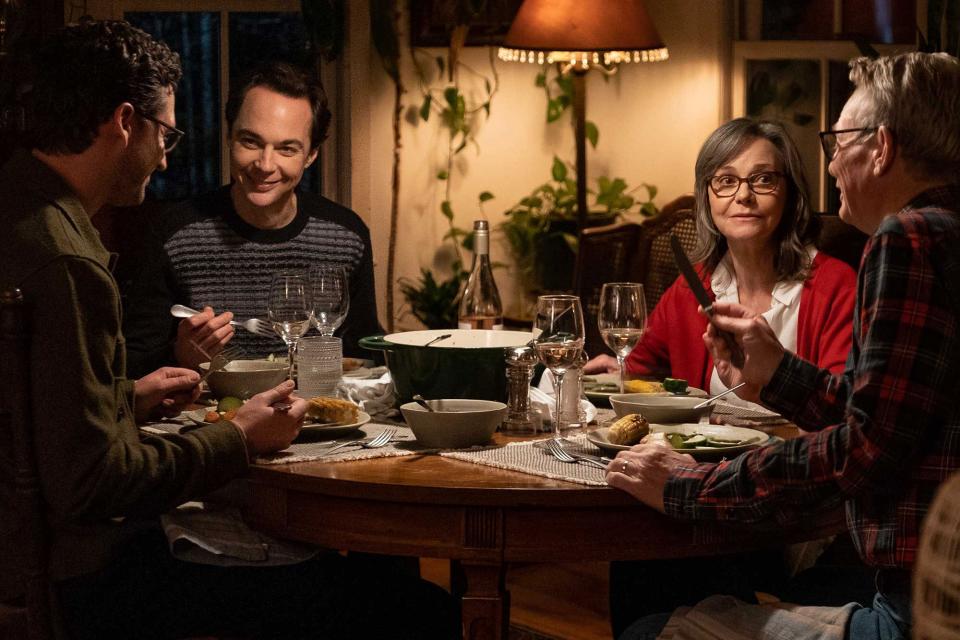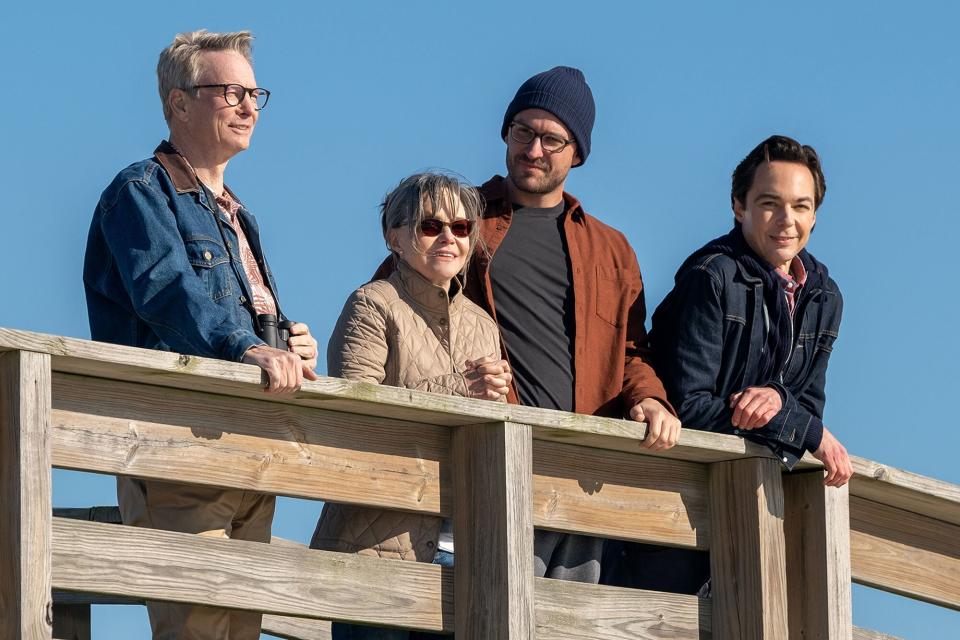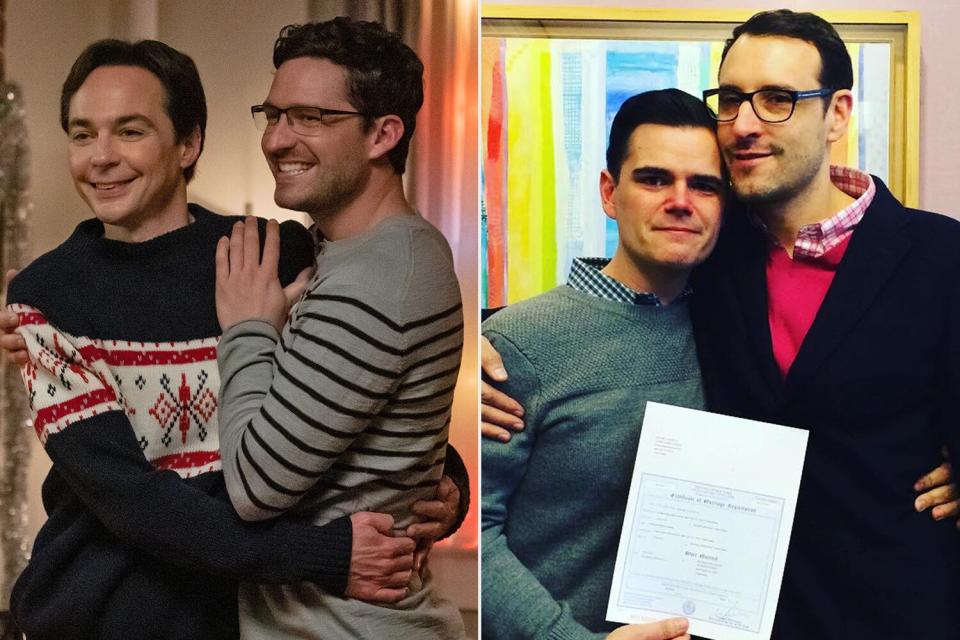Jim Parsons and Ben Aldridge on Shirley MacLaine impressions and gay joy in Spoiler Alert
- Oops!Something went wrong.Please try again later.
- Oops!Something went wrong.Please try again later.
- Oops!Something went wrong.Please try again later.
- Oops!Something went wrong.Please try again later.
Jim Parsons wanted to do justice to two people while making Spoiler Alert.
One was the real-life person he's playing, Michael Ausiello, an entertainment journalist (and EW alum!) whose 2017 memoir, Spoiler Alert: The Hero Dies, is the basis for the film. The other? Shirley MacLaine.
In a scene during which Michael's husband, Kit (Ben Aldridge), is waiting to be admitted for chemo and is in extreme pain, Parsons, as Michael, approaches the nurse's station and goes full McLaine in Terms of Endearment to demand they give Kit a bed. "Give my husband a bed!" he demands, banging his fists on the counter.
That moment was not in Ausiello's book, nor was it something he did in real life, but rather an homage by Parsons to one of his favorite films.
"It was funny because in the book, Michael references that he worried in that situation he would have to go all Shirley MacLaine on the nurse in order to get the job done," Parsons tells EW. "He didn't in real life, but we were like, 'Well that's too good to pass up.'"
The Big Bang Theory actor continues, "I know that movie very well. It's one of my favorite movies of all time. But the day of, I did do a quick YouTube of 'Give my daughter the shot!' And she did something at the end of it, she kind of does a nod to the nurses station. I was like, 'I'm gonna find a way to get that s--- in there.' Cause if you're gonna put in an homage to Shirley MacClaine, give her as best you can."
The moment is one of levity amid the film's heartbreaking story of Kit's diagnosis and eventual death from cancer (we're not spoiling anything — see title). But more than a cancer movie, the film is a moving and complex portrait of a relationship. We called up Parsons and Aldridge to talk about how they brought such poignancy to the story.
![https://www.youtube.com/watch?v=G9qIwkAi_Zk SPOILER ALERT - Official Trailer [HD] - Only In Theaters December 2 Credit: Focus Features/Youtube](https://s.yimg.com/ny/api/res/1.2/iXcgvLI1CU4iQu3biECGfQ--/YXBwaWQ9aGlnaGxhbmRlcjt3PTk2MDtoPTY0MA--/https://media.zenfs.com/en/entertainment_weekly_785/96238653de184d906dad7e259ff9fcd3)
Focus Features
ENTERTAINMENT WEEKLY: Jim, you were the driving force behind this project, coming on to star and produce. Did you know Michael Ausiello as a journalist, or what brought you to the book?
JIM PARSONS: I knew Michael well enough. Not socially, but I had done several interviews over the years with him. He asked me to conduct a Q&A at Barnes & Noble when the book was about to come out. I read his book. My husband watched me read the book and watched me sob and said, "Think it should be a movie?" And I said, "I don't know." And he read it and said, "I think it should," and he asked Michael if we could option the material.
Did both of you have access to Michael to ask him questions? Especially for you, Ben — Kit is no longer with us, so I would imagine that would be a useful resource in some ways.
BEN ALDRIDGE: Michael was extremely generous. Once I'd finished the book, we started emailing and he just made himself an open resource. He was at the monitors every day as an executive producer and would help me with things like the level of pain Kit might be experiencing in certain scenes, how he might sit. He'd also saved so many of Kit's artifacts. The black point-and-shoot that I'm using in the film is Kit's actual camera. It's very powerful to hold that and to use that and to think that I was doing the things that he did with that camera.
Of course, that added a certain level of pressure and responsibility. How much Michael loves Kit is so evident in the book and could have overwhelmed me. Having Michael there, for both of us, we were able to look at him and be really tethered back to the truth of the fact that they had lived this.
Whether it was something Michael said or just through observation, were there one or two things that really helped you click into who Michael and Kit were?
PARSONS: Everything I'm thinking of is coming from the book because he revealed so much there that it would've been quite a feat to say something in person that would've been even more illuminating for me. But I do think of how good-looking he felt Kit was, how out-of-his-league he felt he was. Even though there's a certain self-deprecating nature to that, there is a certain treasuring of the other person that I really enjoyed.
ALDRIDGE: Something that really helped was that Michael was able to point me in the direction of Kit's photography. He forwarded an email from Kit's very close friend, Jen, and they pointed me to the Kit Cowan archives, which is still an Instagram account that Kit has of his own photography. And Kit's Flickr account. That gave me a surprising insight into how he saw the world and his humor. He was a documentarian, so he took photos of really funny and beautiful things. That helped me to try and see the world the way he did a little bit.
Jim, I know those Smurfs are all actually from Michael's collection. How did you befriend them? Did you become comfortable with them as yours?
PARSONS: I accepted that we would be sharing the same space in an overwhelming way for a little bit of time. And I just became peaceful with it. They had created that bedroom and the apartment, and we had not seen it. There was talk of maybe not letting us see it until we walked in the first time. I was like, "Absolutely not. First off, it's my room as character. I would know what it looked like." But I was like, "I need to see this." Thank God we did. It was overwhelming. But not as overwhelming as hearing from Ausiello that that was just the tip of the iceberg.

Linda Källérus / FOCUS FEATURES
Because the bulk of this story is Kit's diagnosis and moving through the illness, we have to get into this love story and this 13-year relationship in a relatively short amount of time. How were you two able to find all those layers in what is just a handful of scenes?
PARSONS: The screenplay helped. But also we didn't shoot much early stuff until we had already shot a decent amount of later stuff. Actually, the first time we ever worked together was getting the stage-four diagnosis. We really jumped in the deep end. There's such clarity in those harsh moments.The more amorphous stuff is the cat-and-mouse of getting to know somebody. The fact that we had been able to work together for a little while before we did those was really helpful. We knew where we were headed.
ALDRIDGE: Another thing that really helped us is that we started as soon as it all came together. Jim emailed me and the subject just said, "Let's start." I was going be in New York for a day before we started filming.
PARSONS: We had no time to meet each other.
ALDRIDGE: So over about two or three months, we emailed long letters. Sometimes it was about the project, but mostly just about ourselves, our partners, our parents, our lives, our own journeys, our own queer experience. That meant that we weren't going in cold. Even though we didn't know each other in real life, we knew a lot about each other. But even though I felt really comfortable, there was still the first day nerves of: I hope what we've learned about each other in emails translates into a really nice friendship in real life and on set. You have to really trust not to rush those moments and not to be like, I want to be that person's best friend right now.
Sally Field mentioned that she had an opportunity to find out a lot of things through improv. Was that the same for both of you? And if so, what were some of your favorite moments that you discovered?
ALDRIDGE: [Director] Michael Showalter really fostered that on set and never wanted us to say a line that didn't feel right to us. We would refer back to the book often the night before. We would read the scenes for the next day, and then we'd text about them or discuss on set the next day. But sometimes moments of dialogue from that would filter their way through into improv and the scene. Somewhere where that really happens is the scene in which we give each other gifts for the first time, the first Christmas — the magic set and the wand moment — that was a very live interplay of improv.
PARSONS: It wasn't an improv, but it was a very late addition: As we were approaching that [climactic] patio scene. I had re-read something and I was like, "I really want to get in that part where Michael talks about, 'I could never tell you how good your ass looks in khaki pants because then you'd know how beautiful you are.'" It was really special to get to collaborate in that way and bring what you noted personally and connected with in this story.
ALDRIDGE: Something I didn't realize I was going have to improvise on — Michael Showalter surprised me on the day, which was so daunting — was Kit telling Bob (Bill Irwin) and Marilyn (Sally Field) about the cancer diagnosis. As scripted, it cuts to outside the windows and you don't hear him saying it.
PARSONS: I remember when Showalter told Ben, he's like, "Just talk about it." I was like, "I would lose my mind if he said that to me." You want me to describe in my own words somebody's cancer diagnosis and their journey?
ALDRIDGE: I thankfully felt like I knew enough about it to do it, but it also felt like very sacred to improvise that. Also, to improvise it to Sally.

Linda Källérus / FOCUS FEATURES
Ben, we often hear about actors having to go through really grueling physical processes to play someone who's dying. Was that the case for you?
ALDRIDGE: No, not a physical process. The way in which we filmed it meant there was no window to lose weight. That's all makeup. Three hours in a chair to get that. I wouldn't call that grueling, either. I would be often hit with a wave of emotion for Kit. My empathy would be really dialed up. If I were to look at Michael on set, particularly some of the oncology moments — in the book it gets so bad and we give a snapshot of that in the film. But it was really extreme suffering. And sometimes I'd be hit with the fact that someone really lived this. There's a strange privilege and an honor in being able to walk in those shoes and attempt to do it justice.
That final goodbye on the bed is so devastating. Jim, tell me more about the head space for that. I can't imagine it was a good place to live in for the day.
PARSONS: It's funny because it was and it wasn't. It was an honor to get to be there. It is really the depth of humanity in a moment like that. The goodbye in the book that Michael wrote was different than that. There were a lot of similar words used. But it was so apparent, the soul-to-soul speaking that was going on right there.
Viewers have mainly come to know you as a comic actor. Would you rank this as one of the hardest scenes you've had to tackle?
PARSONS: Oh, no. Only in that there was a clarity of purpose. The acting part of it wasn't difficult at all. It was joyfully a pleasure to get to be there, telling this story that I found so special and connecting to another actor who was so equally meshed with me in this moment. It was why I wanted to become an actor to begin with, if I'm being honest with you — the chance to portray these extremely human moments. There's nothing more human than looking death in the face.

Giovanni Rufino/2022 FOCUS FEATURES, Michael Ausiello/Instagram
One thing I really was touched by in this film was it's restraint. It's not emotionally manipulative. Did you have to both check yourselves or work hard to maintain that?
ALDRIDGE: Michael Showalter is the author of that element of it, really. He never came on set and said, "Don't cry." He never came on and said, "Restrain that. Pull that back." He would always allow me and Jim to be inside the moment. In the Kit TV surreal moment, it's their final goodbye and it feels so momentous. My instinct was I wanted Kit to show Michael that he loved him. Michael Showalter was more interested in Kit saying a gracious and loving and peaceful goodbye. He was letting Michael go at that moment, which I found really difficult to do because I was like, "I just want to act! This is my moment too!" [Laughs] I remember struggling on the day being like: I feel this isn't necessarily the choice I want to make, but ultimately always trusting Michael. He's not sentimental as a director, and that's why he's such a good fit for this.
PARSONS: They always say you need to create a safe space for people to do things like this, if they're going to try and go to those areas of life and emotion. The way in which I felt he created the safe space for us was that you knew you had somebody who was not going to let it get maudlin. You knew you had somebody who was not going to let it get indulgent, so you could feel free to indulge and it was never going to be a problem.
Predominantly in culture, we've had stories of gay tragedy, not gay joy. Spoiler Alert is both. Did you feel pressure to make sure both of those things were given equal weight?
PARSONS: I didn't. It didn't cross my mind because I had such an understanding of the source material and what we were making that, even with the deep valleys of tragedy and sorrow in this, this is a story about the joy of really going through your life with another person. Even with the sadness, in fact, partly because of the sadness, that's a full life — and that is ultimately joyful.
ALDRIDGE: I didn't either. I absolutely agree that most of the stories and the ways in which we've been represented have been tragic. But that's because also there is a lot of tragedy in the gay narrative. It's a way in which my generation has learned about history. Those stories, about HIV and gay shame, are so important. I did connect to this because it's outside of that, and because their love and their joyfulness is at the center of it, but also, we're not immune to real life as gay people. I understand the need and the want and the craving for just joyful stories about ourselves. This is more leaning toward that, but I don't think that was by design. It's a real story that really happened.
PARSONS: We both felt such immense joy about getting to portray such a complicated, layered experience of this gay couple. It's a rare experience. Especially since there haven't been many movies about gay romance, this was a really rare gift to get to portray a fully expansive romance — all the ins and outs and ups and downs of two men who happen to be in love with each other.
Spoiler Alert is now in theaters.
Related content:

